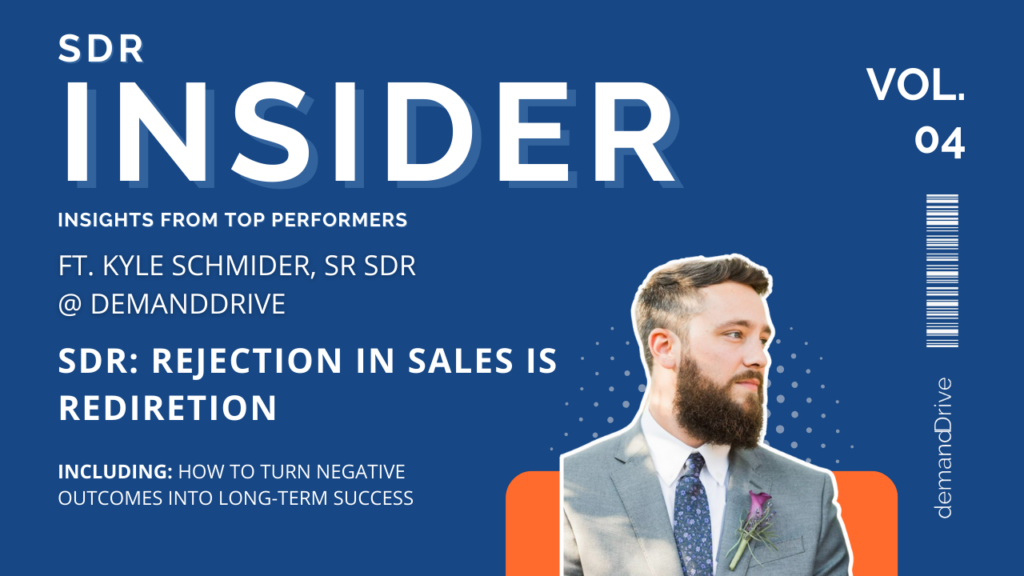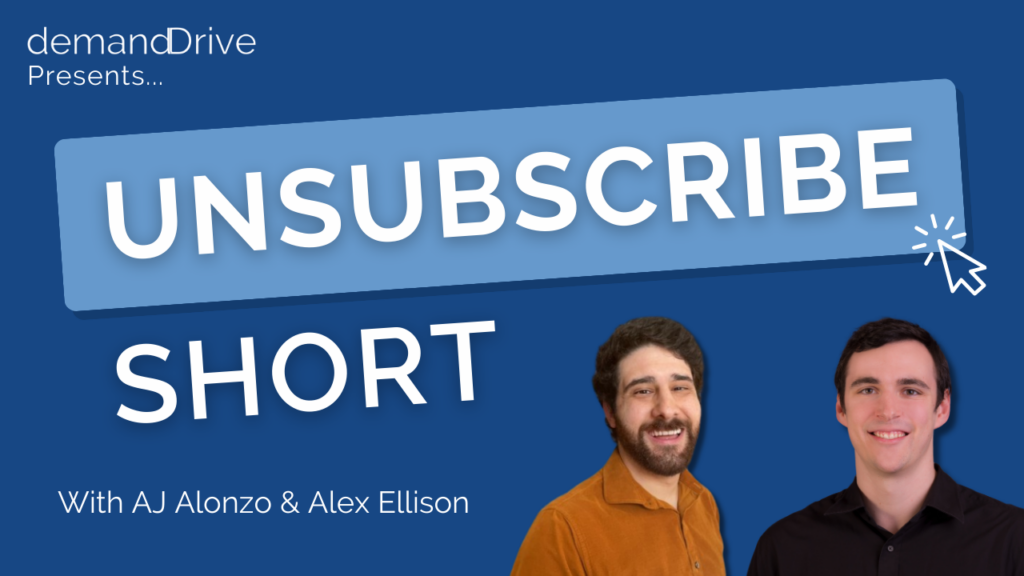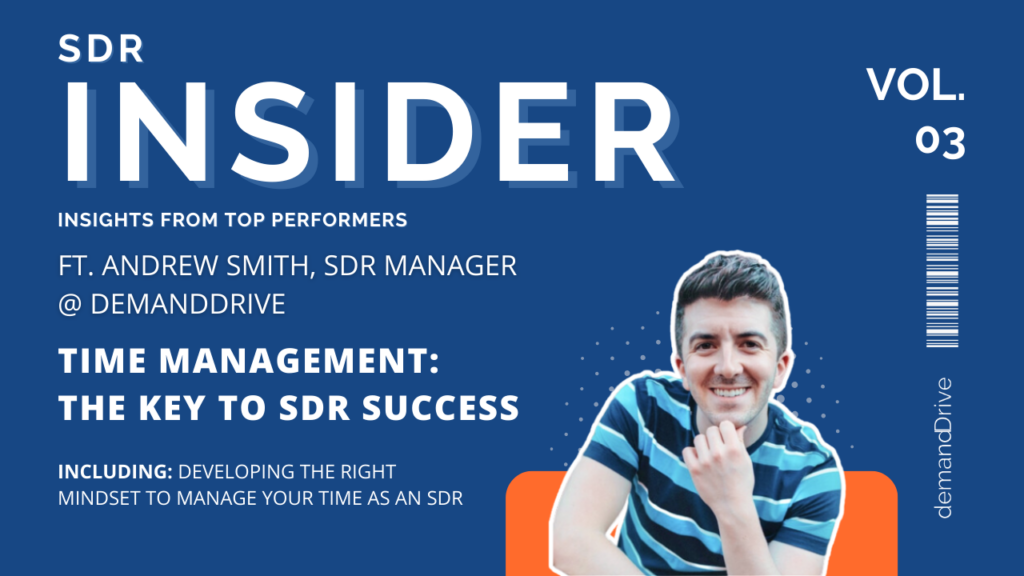What Club Sports Taught Me About Sales Development
You’re listening to UNSUBSCRIBE! Join AJ and Alex as they dive into their mysterious pasts…as former club sports players in college.
Yeah, we’re not that interesting 🤷 😅
Learn about the worlds of competitive Ultimate Frisbee and Rugby, and what parallels can be drawn between those and the world of sales development!
You’re listening to UNSUBSCRIBE!
Learn about the worlds of competitive Ultimate Frisbee and Rugby, and what parallels can be drawn between those and the world of sales development!
Key Takeaways
Blog in mention: bit.ly/2DEIldu
📞 It’s not just you trying to make as many calls as you can during the day. You’re on a team with other people, and your peers are working toward the same thing, so you need to establish a good back and forth.
🤥 As an SDR, if you really want to fudge numbers or if you want to make up activities in your CRM, you can do it, but you’re only hurting yourself. And that expands to the rest of the team as well. Hold yourself accountable, and that positivity will ripple through the team.
😇 You have two options: You can ignore your manager (and just pretend like you did what they asked) OR you can be honest with them. Tell them what happened and make sure that you’re, you know, on the right foot moving forward.
“A lot of people look at Sales Development as a sort of, individual, lone wolf type job…but, in reality, you’re on a team with other people, and what you do impacts what they do.”
Meet our team ➡️ https://bit.ly/dD-Team
Follow us on LinkedIn ➡️ https://bit.ly/dD-LI
Want to work with us? ➡️ https://bit.ly/Contact-dD
Want to work for us? ➡️ https://bit.ly/dD-Careers
INTRO: 00:04
You’re listening to Unsubscribe, a podcast where we explore all things sales development to give SDRs and managers alike, the tools that need to succeed.
AJ: 00:17
Welcome to Unsubscribe! I am your host, AJ Alonzo, director of marketing here at demandDrive. And I have with me as always Alex Ellison.
Alex: 00:26
I sure am here.
AJ: 00:27
You sure are. And today we are continuing in our campaign, our quipisode campaign leading up to the conversation with Brian Trautschold at Ambition. And today Alex and I are going to have just a bit of a conversation back and forth. We don’t have a guest with us today, but we wanted to talk about some of the stuff that really hit home for us on a personal level. I wrote a blog a while ago. It was a while ago. Not super relevant anymore, but it’s titled “What Ultimate Frisbee Taught me About Sales Development” for everyone in the audience that doesn’t know I played competitively in college…
Alex: 01:02
I don’t think anyone in the audience knew that.
AJ: 01:04
No, I mean…Maybe people researched me, I dunno. I don’t know I found a lot of parallels between the sport and sales development, so it compelled me to write the blog, but Alex is here as well, not only because he’s on every podcast, but because he had a pretty similar experience in college playing a club sport.
Alex: 01:22
Yeah, I was on the, uh, actually at one point the president of the club rugby team. I know it’s so important the club rugby team at my school. So I’m in a similar vein. Club sport small sort of universe of people who play it, you know, as far as the struggles of playing a club sport in college, I think we could probably relate to each other.
AJ: 01:44
And I saw the rugby team struggling in this sort of similar capacities as the Ultimate team in terms of trying to get field space and trying to make a case to the buildings and grounds crew to the athletic department that they have a right to the same field space as Varsity sports and all that jazz. So, that’s really what we wanted to talk about with some of the stuff that Brian had mentioned in his article or in his interview with us and how that relates to sort of our experience in terms of having to feel a little bit of the pain to know how to do it better. So a lot of the stuff that we went through sort of trying to legitimize a club sport, get funding, get field space, things like that. And, and really how that equates to sales development. I think I touched on it pretty well in my blog. For anyone who wants to read it, you can go to my LinkedIn page and check out my articles, small plug there. But I really wanted to focus specifically on sort of where that comes into play in the sales development space. So in terms of where we might have seen some struggles legitimizing, like I said, the sport that we’re playing and how in the sales development space, that takes a lot of grit and grind for an SDR to sort of get through their day to day activities, and really make an impact on the business overall. So I think we both kind of experienced that not only in college but then as sort of our first real job in the workspace, the parallels between the two.
Alex: 03:12
Do you have any specific ones you’d want to dive into there? I’ve got a couple on the top of my head…
AJ: 03:17
Go ahead. I’ve done a lot of talking so far haha
Alex: 03:18
For sure. So one of the things that I sort of immediately saw as a comparison is sort of the aspect of attrition and how it relates to, basically everything I did, regarding rugby as well as you know, SDR stuff. So, you know, just for those of you who don’t know rugby, it’s often referred to as a game of attrition. It’s a lot of, you know, short gains, sort of two steps forward, one step back type situations where you’re slowly working your way down the field to score points. It’s similar to football if that helps anyone. And you know, not only was that attritional but off of the field. There were a lot of things we have to deal with as far as, you know, making sure that the, you know, the vans that we could have vans to drive to different games, making sure that the fields were there, and even making sure we had 15 people on our team and, you know, I went to a smaller school that didn’t even have a football program, so we were, you know, the contact sport and there weren’t that many people that, you know, really embraced that I’ll say. So there’s a lot, there were a lot of things that I would have to just do over and over and over again. And slowly but surely over time you sort of realize, you know, you’re gaining traction. And then sort of how that pulls back to, you know, SDR work. It’s the same thing as you know, you’re making who knows how many cold calls, 40, 30, 40, 5,100, 200 cold calls a day and you know, you’re not really going to notice that day unless you have a great day, you know, the impact that your work is having. But, you know, maybe by the fourth or fifth time you reach out to someone, they finally get back to you. You do it enough days in a row. You slowly build up this pipeline that then becomes a little bit easier moving forward where you have, sort of past experiences to draw from so that you, you’re moving forward in the direction as, as best you can.
AJ: 05:09
I think that’s something that I also noticed when I was participating in, in my club Ultimate team is that some of the work that you put in today, you don’t realize today, but you’ll realize in the future whether it be for you or even whether it be for another generation of people. So, breaking stereotypes is one thing I talked about in my blog and something that the Ultimate community has done a really good job of is sort of, people look at someone who plays ultimate and they assume that they’re like a shoeless hippie and they’re just on the field or the quad or whatever, tossing a Frisbee back and forth. But in reality, it’s like a competitive game. There are professional leagues. There’s like, it’s now a recognized Olympic sport. It’s not in the Olympics, it’s not there yet, but it’s recognized by the IOC (because rugby is). All right, well this isn’t a competition. But that idea of doing the work now and taking 10, maybe even 15 years for the sport to really catch on and sort of gain a national presence means that in the future, the work that you put in in the past is sort of recognized. And that’s something that you see a lot in the SDR role. If you have a day where you make 80 calls and nobody picks up the phone, which happens more often than not, you might leave feeling dejected thinking this was a horrible day, but you never know that maybe on the other line a VP listens to one of your voicemails, hears something that they’re interested in, goes to the website, sees your email and then calls you back the next day. So all the work you put in the day before, you recognize at some point later in the future? So that’s like a sort of directly equitable thing between the two that I saw. I also wanted to bring up something on your idea of attrition. Something else that, it’s a different definition of attrition, but something that you see a lot in the SDR role is, is you know, a somewhat higher level of turnover than other positions. You’ll see SDRs who kill it and then move onto AE positions or move to a different company and sort of take on a management role. That’s something you see a lot in club sports as well. It’s tough to field even a team, Ultimate half as many people as rugby, you only need seven people on the field at a time, but it’s sometimes hard to get seven people to show up to a practice. So like you Alex and sort of you having to do the same thing over and over again, as co-captain my senior year, it was my job to make sure that we just got people out of their beds for tournaments in the morning. And if you had eight people that could go to a tournament, then you were like, you just had this feeling where you’re like, we can actually play and this is amazing and it’s, it’s hard to like get people interested in the sport, keep them interested and then have them stay with you for, you know, hopefully their four years of college.
Alex: 07:50
Yeah. And I think the sort of the, the teammate accountability is something I wanted to touch on as well. I think, obviously it’s one of those things where even when you’re just, you know, five years old and you’re just starting to play baseball or basketball or whatever…
AJ: 08:05
That was the good time in my life.
Alex: 08:07
There was always those coaches who are like, you know, your kids, you’re going to take these lessons and you’re going to use them later in your life. And first of all, I was like, who cares? I’m Five. But there is some truth to that. And you know, just, you know, in the same sense that you, you’re accountable to your teammates to wake up on a Sunday morning, maybe after a night out. And you know, make it in a playable state to the game or the tournament that weekend, I think it’s important to is to really recognize the accountability that you have as an SDR, you know, to other SDRs on your team, to, you know, your manager, you know, the account exec that you’re passing leads to write and sort of making sure that you’re providing everything that they need from you.
AJ: 08:51
Yeah. I think a lot of people look at sales development as a individual sort of lone wolf type job where you know, you’ve been given a list of accounts and it’s your job to make like 80 phone calls a day and that’s kind of it. But in reality, you’re on a team with other people and what you do impacts what they do. So having…something we do a lot internally here, demand drive is team contests and that sort of takes your accountability idea, Alex and spreads it to a team level. So it’s not just you trying to make as many calls as you can during the day. trying to get as many live connects as you can during a day, but you’re also sort of on a team with other people and your peers that need to do the same thing, so back and forth. You’ll give tips and tricks in terms of, oh hey, I listened to your last voice mail. Maybe it makes more sense to shorten it. Or hey, you had someone on the phone and I heard something that you might have done better or differently to get them to agree to a meeting or at least to like a followup call, something like that. So having that team accountability is really important, because you don’t want to let other people down.
Alex: 09:52
Even beyond that, I think owning up to your own mistakes is a huge part of accountability where it’s like, you know, look, I, you know, I’m fully aware of maybe I forgot to call someone back when they asked me to follow up at a specific time. You know, and you have two options: you can ignore your, your manager and just pretend like you call them back and they didn’t pick up. Or you can be honest with them. Tell them what happened and make sure that you’re, you know, on the right foot moving forward.
AJ: 10:14
Yeah. There’s a lot of opportunities to take the easy way out. Very similar to like what we just talked about. You can just quit a rugby team. You can quit an Ultimate team if you think that if the going gets tough and you want to leave, no one’s going to stop you. It’s not a varsity sport. You’re doing it because you want to do it. Similarly, as an SDR, if you really want to fudge numbers or if you want to make up activities in your CRM, like you can do it, but you’re only hurting yourself. If you then sort of expand that to the team and you’re hurting the team. Maybe someone holds themselves a little bit more accountable.
Alex: 10:45
Right. Yeah.
AJ: 10:48
Yeah, some pretty solid stuff in terms of equity, equitability. I don’t know. I don’t know what the right word is for that. (That’s all right. We’ll go with it) Correlation. There’s a really strong correlation. That’s why like what? Five years ago I wrote a blog about it. Geez. I’ve been here for too long. I lied it wasn’t five years ago. It was like…
Alex: 11:06
Four? Oh man, what a difference that makes.
AJ: 11:09
It does. Well I hope you guys learned something in the audience just in terms of general accountability, team accountability and how you hold yourself as an SDR and breaking stereotypes, grit and grind, stuff like that. Traits that you need (overcoming adversity). Yeah, general traits that we feel like maybe if you have played a club sport, you would be a little bit more prepared for the SDR role. Not saying that it’s a requirement…
Alex: 11:34
but maybe my 5 year old basketball coach was right.
AJ: 11:36
Maybe, maybe. Yeah. My teeball coach was not right. He didn’t care about competition at all. He just wanted us to have fun. (Maybe he was right) Maybe. Maybe this is all about fun. Uh, I doubt it at all. All right, well, any last words for the audience Alex?
Alex: 11:53
No, if anyone has any questions about rugby or what the heck I was talking about, feel free to feel free to contact demandDrive and get in touch with me.
AJ: 12:01
Yeah, I would say the same for me. If you’re, if you’re looking for an ultimate team, I’ve got an opening. Haha. All right, well, thanks for listening everyone.
OUTRO: 12:08
Thanks for listening to this episode of Unsubscribe. Remember to get less “unsubscribe” emails in your inbox, subscribe to unsubscribe and get your SDR team in tip top shape. See you next week!
Other Episodes
Ep. 4 • 31 min.
Ep. 2 • 11 min.
Ep. 3 • 48 min.




